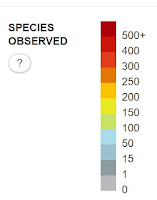What is eBird?
eBird is the world’s largest
biodiversity-related citizen science project, with more than 100 million bird
sightings contributed each year by eBirders around the world.
With a few minutes spent on the mobile phone app, birders can
record their sightings and their data would contribute to this. Many birders
spend time blogging or tweeting about their latest escapades in the field, so why
not put the sightings to conservation use on eBird?
Walthamstow
on eBird
eBird is a
useful tool.
To give eBird a patch watching context, Walthamstow Reservoirs is the 3rd top London ‘Hotspot’ for number
of species recorded and Walthamstow Marshes is
the 9th.
The WaterWorks NR appears in the top 30 under the guise of ‘Leyton
Marsh & WaterWorks.’ But then Leyton Marsh is part of Walthamstow Marshes,
so that’s a bit messy. The WaterWorks NR itself
comes in at London number 34:
Bird blogging or tweeting, at its best, informs another birder or wildlife
enthusiast of wildlife news or shares where and when to view wildlife; at its worst, it is someone’s holiday photos or latest tick (somewhere in between does a bird blog or tweet lay).
With eBird, there is no question of its usefulness. An eBird report can contribute to graphs, data and trends for the
patchworker or conservationist. For example:
January to December Observations of
Waterfowl on Walthamstow Marshes 1900 - 2018
Northern
Wheatear Observations on Walthamstow Marshes 1900 - 2018
This is a link to London's eBird data (find your patch from here):
So, why do so few birders use eBird?











No comments:
Post a Comment